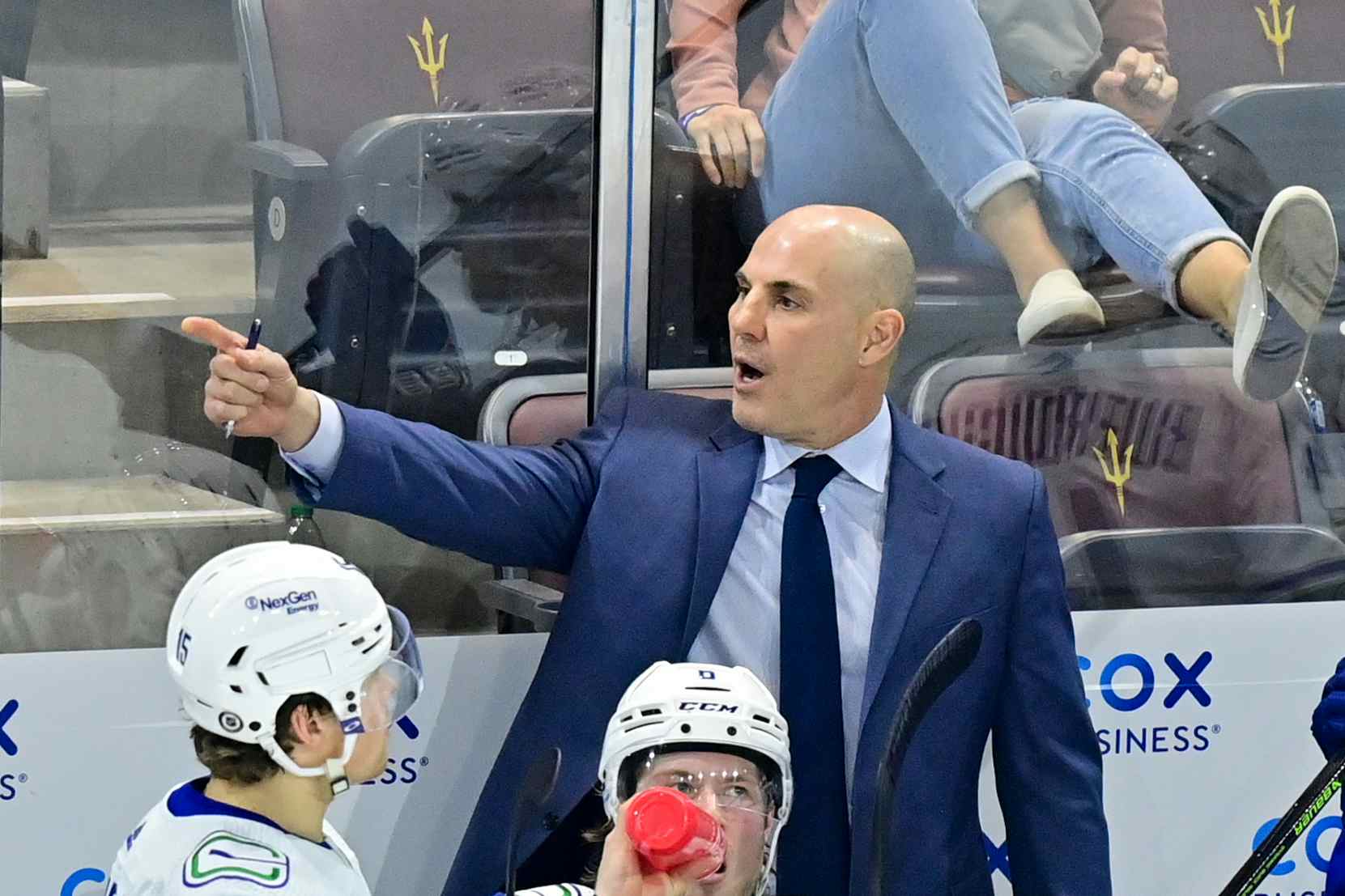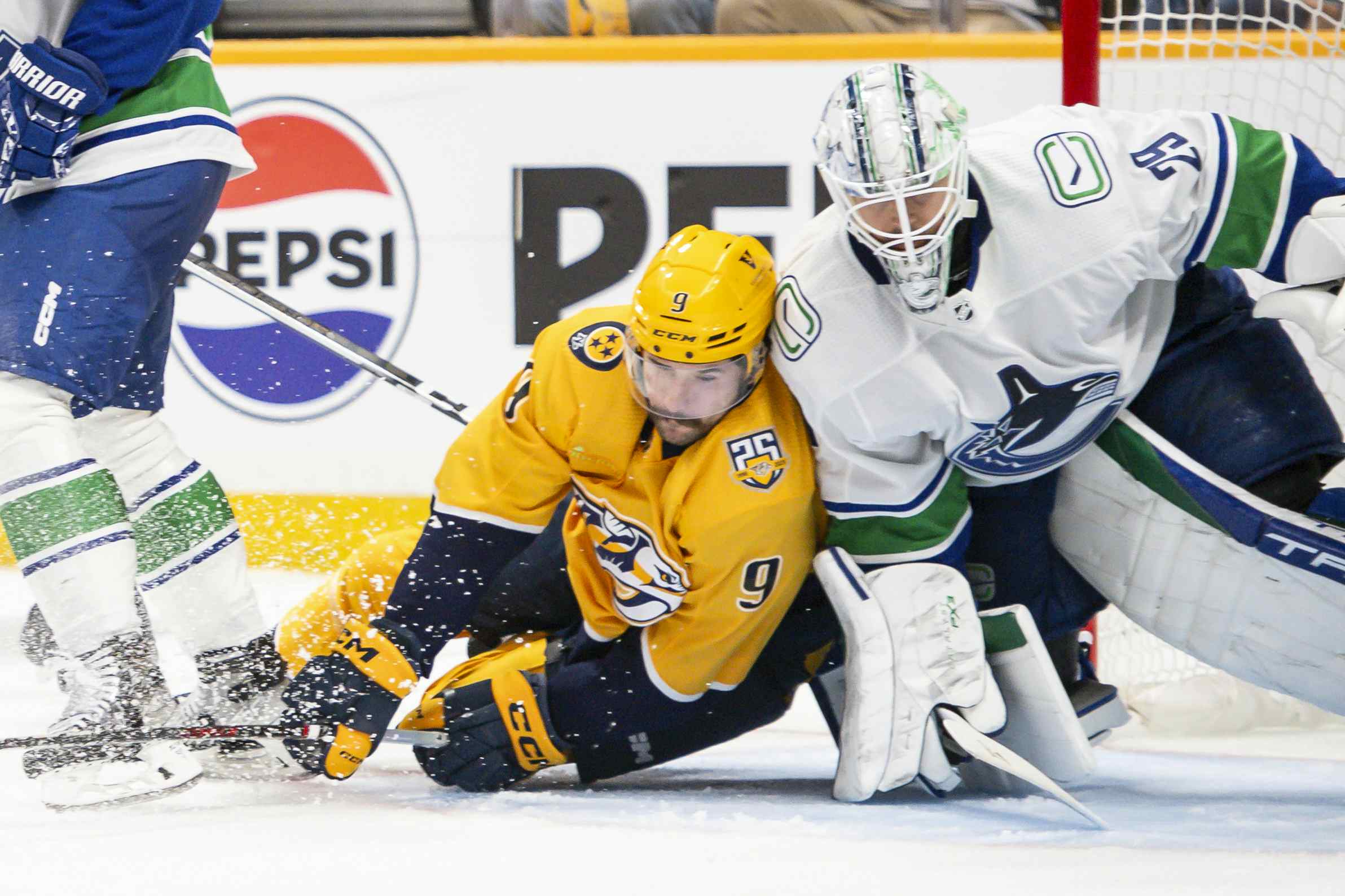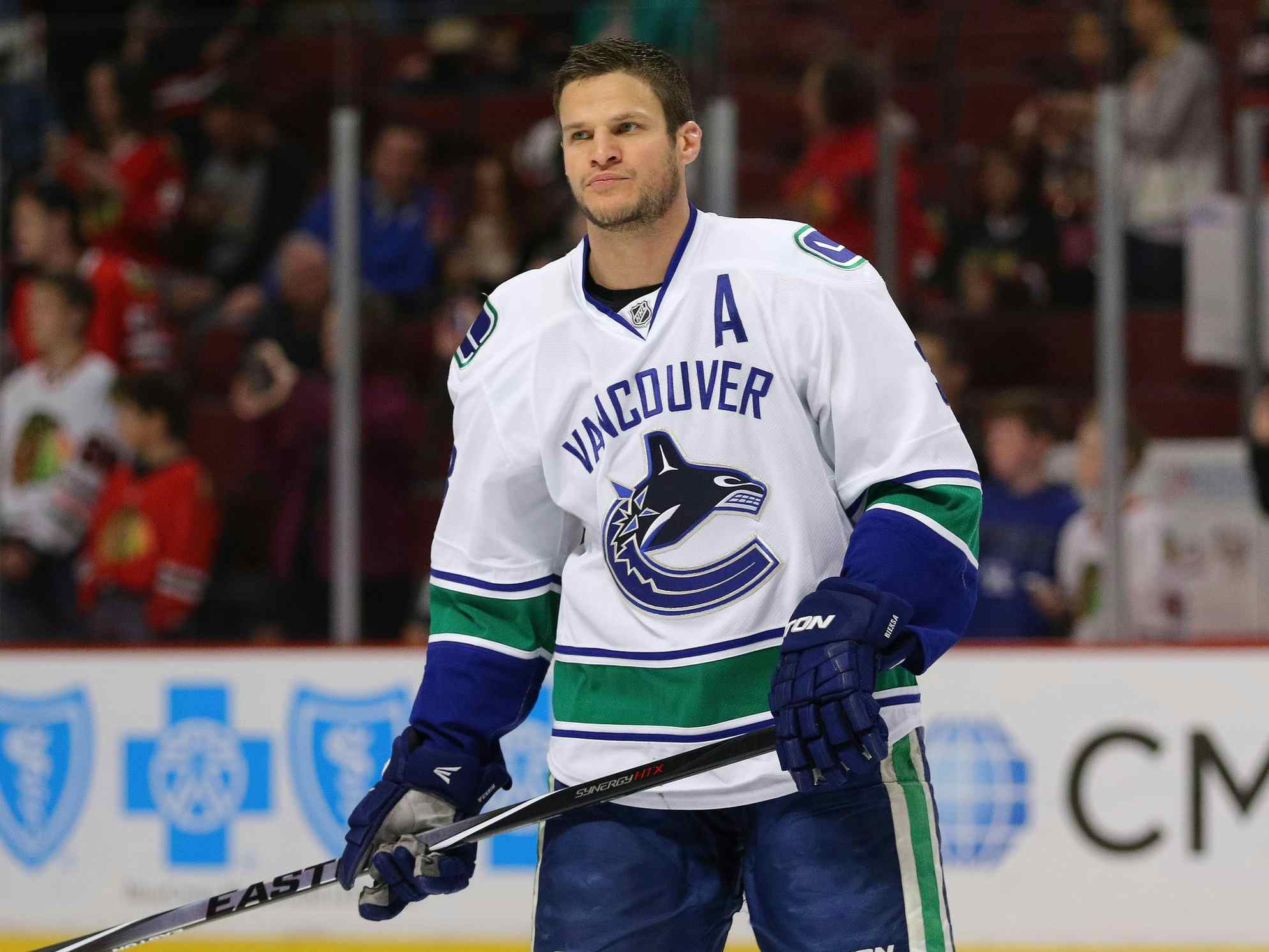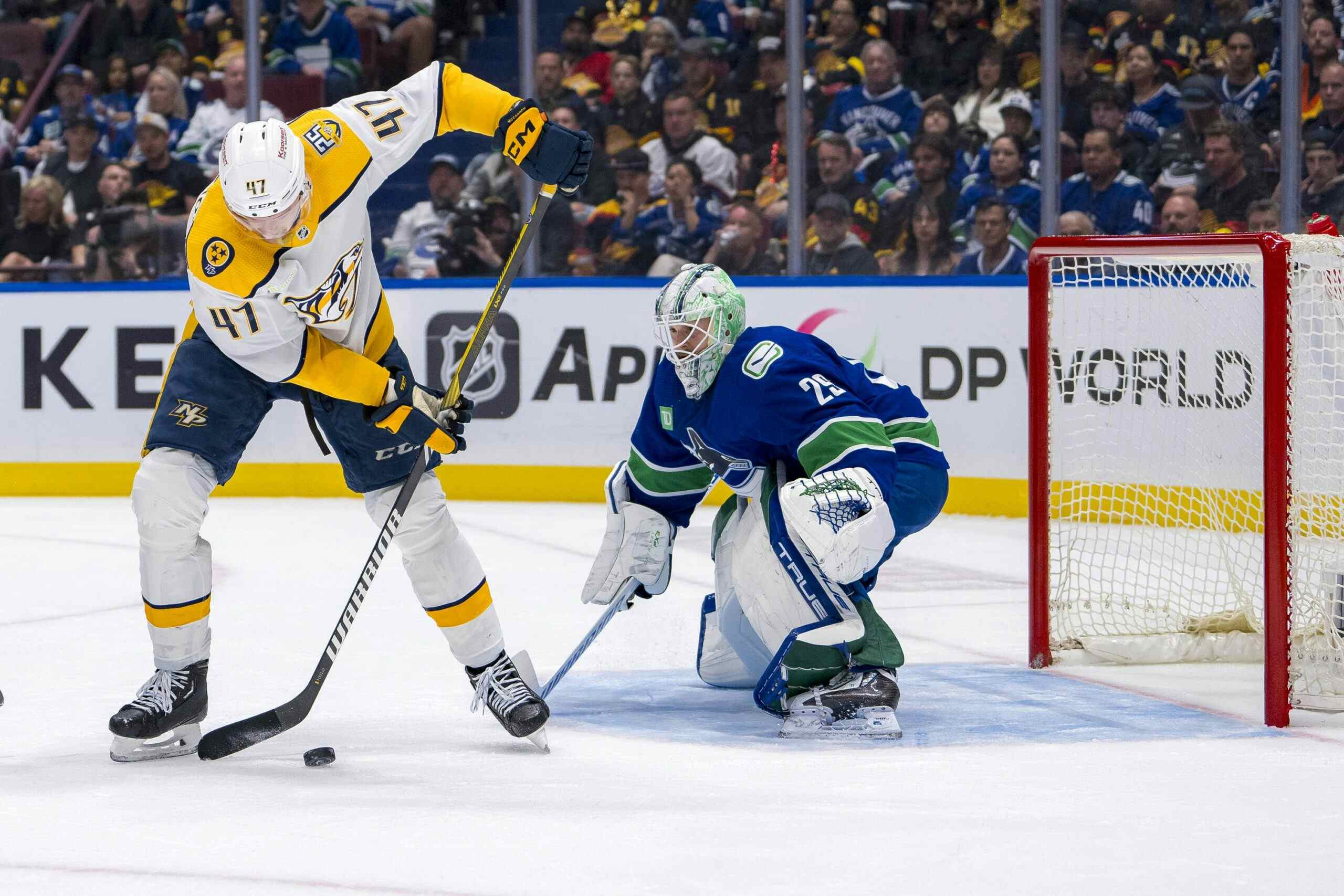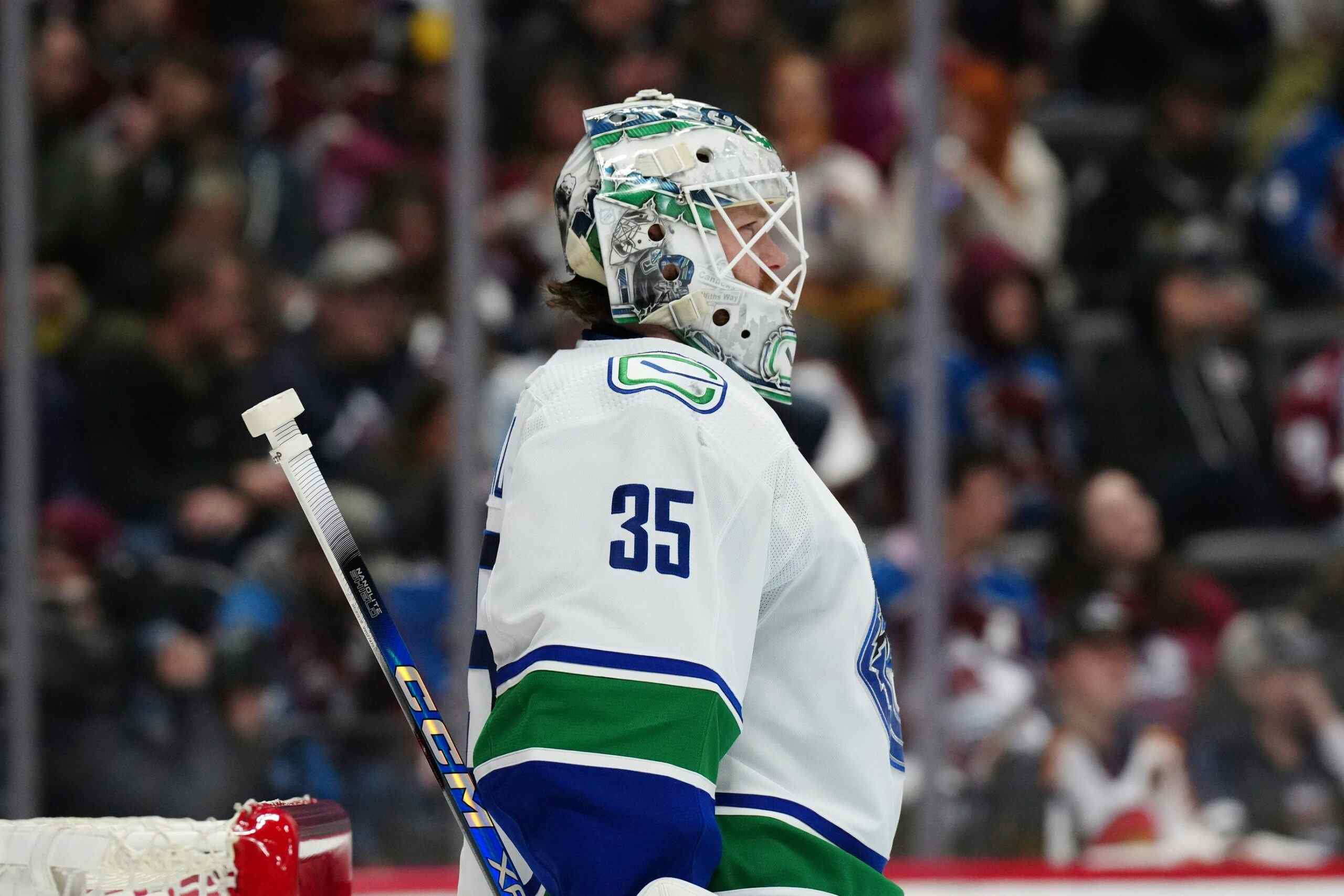Relive the 2002-03 Vancouver Canucks Season
By J.D. Burke
8 years agoAs the off-season roars along in Vancouver, this city becomes increasingly fond of times past. With today’s recap of the 2002-03 season, I aim to provide one such incarnation of a younger, more exciting and promising iteration of this franchise. With the West Coast Express entering the height of their league wide dominance, accompanied by an intriguing mixture of youth and veteran talent in the peripheries this team was primed to contend and almost did just that.
The results left much to be desired, but the fun that this city had following this franchise was unmatched in a nearly decade long period thereafter. The Canucks were fast, they were fun and I’ll be damned if they weren’t a pretty mean bunch to boot.
And they got pretty much nowhere for their troubles! Relive it all, on the other side of the jump.
Results
| Team Record | Total Points | Standings | Goal Differential | Shooting Percentage | Save Percentage | PDO |
| 45-23-13-1 | 104-points | 2nd in Northwest Division, 4th in Western Conference | +55 All-State, +22 Even-Strength | 11.2% All-State, 9.7% Even-Strength | .906 All-State, 91.6 Even-Strength | 101.3 |
There’s a lot to like about how this incarnation of the franchise performed. They were a near dominant offensive force and the results do much to back that assertion up. The Canucks were shooting at nearly 2 points higher than the league average all state Sh%, but a team with as much top-flight finishing talent as these Canucks could pull that kind of thing off and be given the benefit of the doubt.
Individual Level:

(Courtesy: Hockey-Reference.com)
This is a team that could do some damage physically, oh mighty. Given that this roster features three Canucks well north of the century mark in penalty minutes, it’s safe to say that they weren’t “pushed around” on most nights. This is especially daunting given that these numbers were amassed in the preamble to the “new-NHL” era of officiating, when penalties were actually called in an effort to open the game up – for a few years, anyways.

(Courtesy: Hockey-Reference.com)
With a glowing .908 Sv%, that was the best season-long performance Dan Cloutier had turned in with Vancouver since joining the Canucks by trade two seasons prior. It’s not league average, but it’s relatively close and given the goaltender in question, that’s about as well as you could hope for.
Transactions
Trades:

(Image courtesy: NHLTradeTracker.com)
Net returns:
| Pieces Acquired | Pieces Relinquished |
| Brad May, Chris Herperger, Chris Nielsen, Darren Langdon, Marek Malik, Sami Salo, Tomas Mojzis, 252nd Overall Selection (Sergei Topol), Jeff Farkas | 80th Overall Selection (Dimitri Pestunov), Todd Warriner, Steve Kariya, Harold Druken, Jan Mlavic, Peter Schaefer, Brad Leeb, Ryan Bonni, Josh Holden |
Given that Vancouver left this flurry of moves surrendering only a few project players in exchange for a legitimate top-four defender, a depth defender and a relatively-somewhat-maybe serviceable face-puncher has to be considered a win. Escaping any contending season with the addition of a top-four defender for magic beans is hugely successful and laid the groundwork for Vancouver’s blue line for years to come.
Free Agency:
- July 11th 2002, Vancouver signed unrestricted free agent, Nolan Baumgartner. Re-signed Steve Kariya.
- October 3rd 2002, Vancouver re-signed Todd Warriner.
- October 11th 2002, Vancouver signed Jason King.
- November 3rd 2002, Vancouver signed Mats Lindgren.
Given the Canucks status as contenders, that’s hardly a bevvy of reinforcements coming from free agency. I mean, if it ain’t broke don’t fix it, I guess?
Draft:

Well, if there was a draft that ever defined hit and miss… and miss, and miss, and miss… this is the one! They did about as well as any franchise could hope to with the their first-round selection, taking Ryan Kesler 23rd Overall. Then they went ahead and extracted 42-games in value from the remaining nine picks. Bad drafting: a tradition like no other.
Season Review
Bearing the weight of being a Stanley Cup contender, the Canucks stumbled out of the gate, posting a 3-4-4-0 record in their first month of play. Vancouver atoned for their plodding start with 12 wins the following month – suffice to say, they found their footing. It’s safe to say we can credit a fair amount of this success to a sizable PDO spike, but that’s an impressive stretch no matter the circumstances. The Canucks also set a new franchise high in this stretch, with a 10-game winning streak.
And on a November 25th game against the soon-to-be rival Minnesota Wild, Trevor Linden set the franchise record for goals scored with his 263rd. Suffice to say it was a month of milestones across the board.
As the results became less gaudy and the secondary scoring less proficient, the team became increasingly reliant on the likes of their captain, Markus Naslund. The prolific Swede contributed 16-goals for the Canucks in an 18-game stretch covering both sides of the Christmas break, building towards an Art Ross and Maurice Richard Trophy race down the home stretch. The West Coast Express was in peak season and Naslund was conducting the train.

And so the season moseyed on towards the playoffs, with the Canucks offensive machine a near unstoppable force and key factor in their success. They picked up from their impressive November pace with an equally impressive February, posting a 9-1-2 record in that stretch.
Given the Canucks success and the timing of the 2003 NHL Trade Deadline, it’s no surprise that all remained quiet on the Western Front. The Canucks had made several lateral moves with their depth pieces and picked up a pair of imposing pieces from the Carolina Hurricanes in the months prior, but didn’t look to shake the foundation a la Colorado Avalanche or Detroit Red Wings. Instead, the Canucks doubled down on toughness, bringing back fan-favourite enforcer, Brad May.

It wasn’t long before May made his mark with the club, having a thunderous impact in his first return to action donning the Orca. In a March 11th contest against the St. Louis Blues, Tkachuk attempted to catch a pass with his head down in transition from his own zone. May was having none of that, and laid a booming open ice hit on Tkachuk, who suffered a wrist injury on the play. The Blues expected May to answer the bell not once, but twice, with Bryce Salvador and Reed Low charging him for his transgressions.
Then the Canucks, with the division within their grasps and only the rival Avalanche to contest their claim, became somewhat sloppy in the lead-up to the post-season. The club went 7-7-3-1 in their final 18-games, relinquishing their grip on the title. The Avs went on to edge the Canucks by a single point with 104 to Vancouver’s 105, albeit with less wins on the season.
Perhaps more importantly – depending on who you ask – the Canucks captain simultaneously let slip his grip on the Maurice Richard and Art Ross trophies. Both trophies came down to the wire. Here’s Nucks Misconduct on the final moments of the season..
Heading into their final game, against the sadsack Los Angeles Kings, the Canucks needed just a single point to capture the division crown. Meanwhile, Markus Naslund sat on the verge of history with an opportunity to capture the Canucks’ first ever Art Ross and Rocket Richard Trophies. Naslund sat at 104 points (one ahead of the Avalanche’s Peter Forsberg) and 48 goals (one behind the Avs’ Milan hejduk). However, while the Canucks lost 2-0 on the final day of the season, the Avalanche won 5-2 against the St. Louis Blues in a game in which Forsberg and Hejduk each recorded three points. Naslund finished one point behind Forsberg in the Art Ross race and two goals behind Hejduk. Forsberg also earned the Hart Trophy; who knows whether voters would have been swayed more toward Naslund had he won the scoring race.
Naslund went on to describe the Canucks as “choking” in that final contest, lamenting in particular that the Canucks had set the table for a match with the imposing St. Louis Blues.
Given the way that series went down, it’s hard to not see his point. And while it wasn’t the smoothest of rides, I can genuinely say that in my lifetime there’s been no more enjoyable a seven-game set from the Vancouver Canucks than the one they so-hoped to avoid. It embodied everything one might associate with hockey fandom; the comeback story, rivals, sheer determination and the will of one player forced on another.
For one player in particular, I remember this series as a coming out party even. On the back of some truly horrendous goaltending, the Canucks found themselves down 3-1 to the Blues – an especially bad look, given the city’s expectations of this team. It was going to take a herculean effort to bring this team to the level it was meant to play at and Todd Bertuzzi delivered on every level. It started with this thunderous hit on Barrett Jackman, which I fondly remember as the turning point in this hotly contested series.
That hit is still described as the moment which sparked the Canucks to a three-goal outburst in the second, spurring the club to victory in that game and eventually the series. In reality, it went well beyond that hit. Bertuzzi was a dominating menace, the likes of which Vancouver hasn’t and likely won’t see for a considerable amount of time. The Blues defenders heard footsteps every time they had to chase a puck. They couldn’t move him from the front of the net and god help the players who took it upon themselves to try.
I don’t generally acquiesce to the school of thought that bruisers create space, but when they can genuinely play to the extent Big Bert did, there’s definitely something to it. This isn’t to say the rest of the West Coast Express was lacking by any means. Naslund had a gaudy series looking strictly at boxcars and Brendan Morrison didn’t lag all that far behind.
Heading into the Western Semi-Finals against the Minnesota Wild, Vancouver was again the presumptive favourites. Carrying with them the momentum of their inspiring come from behind 4-3 series victory over the Blues, they leaped out to a 3-1 start over Minnesota.
The series looked as good as done. The Canucks held home-ice advantage and had all but finished the Wild no sooner than they met each other. Then Dan Cloutier-things happened. Bad things happened. All of it happened and none of it was in Vancouver’s favour.
Vancouver went on to surrender 16-goals combined in their three chances to close out the series. Eventually, Vancouver bowed out with a whimper, losing 4-2 on a McSofty of a goal if there ever was one in front of the (then) GM Place crowd.
Rethinking These Canucks
Using the data made available at www.War-on-Ice.com, I was able to dig deeper into the Canucks 2002-03 season than ever thought possible. Using their possession estimates, the Canucks were the fifth best possession team in the Western Conference and 11th best in the league. They were good, but perhaps not as good as originally perceived.
At first glance I can’t help but feel as though the Sedins would have benefited immensely from the availability of these metrics throughout the earlier parts of their careers. Both twins have numbers hovering well above the 55% mark in Corsi For, Shots For and Fenwick For. The production had yet to accumulate, but the Sedins were still an immensely positive duo for the Canucks at even strength.
On the less opposite end of the possession scale, we find the likes of Bertuzzi. The prototype power forward was in the red by both raw and relative measures, proving an immense drag at carrying play. That said, his team leading 3.12 p/60 more than makes up for it – this mark was also good for tenth in the league. Bertuzzi also led the Canucks in even strength scoring that campaign, with 46 points in that state of play alone.
While Naslund’s season was massively impressive looked at through nearly every lens, his rate production leaves perhaps a little to be desired. Despite being in the chase for the Rocket Richard all season, Naslund sat just 28th in G/60 with 1.29 at even strength. But don’t mind my nitpicking, I still consider this one of, if not, Naslund’s best season with the Canucks.
I touched on my intrinsic belief that Murray Baron had very little to contribute from the perspective of territorial play and I found these assertions were very much so true. Baron was by far the worst Canucks defender by Corsi For with an embarrassing 44.28%.
Given the finishing talent from their top ranks and the solid territorial play from their depth contributors, this club should have been able to compete for the Stanley Cup. It’s a difficult goal to attain though when Ondrej Pavelec the First is backstopping your franchise…
Recent articles from J.D. Burke

